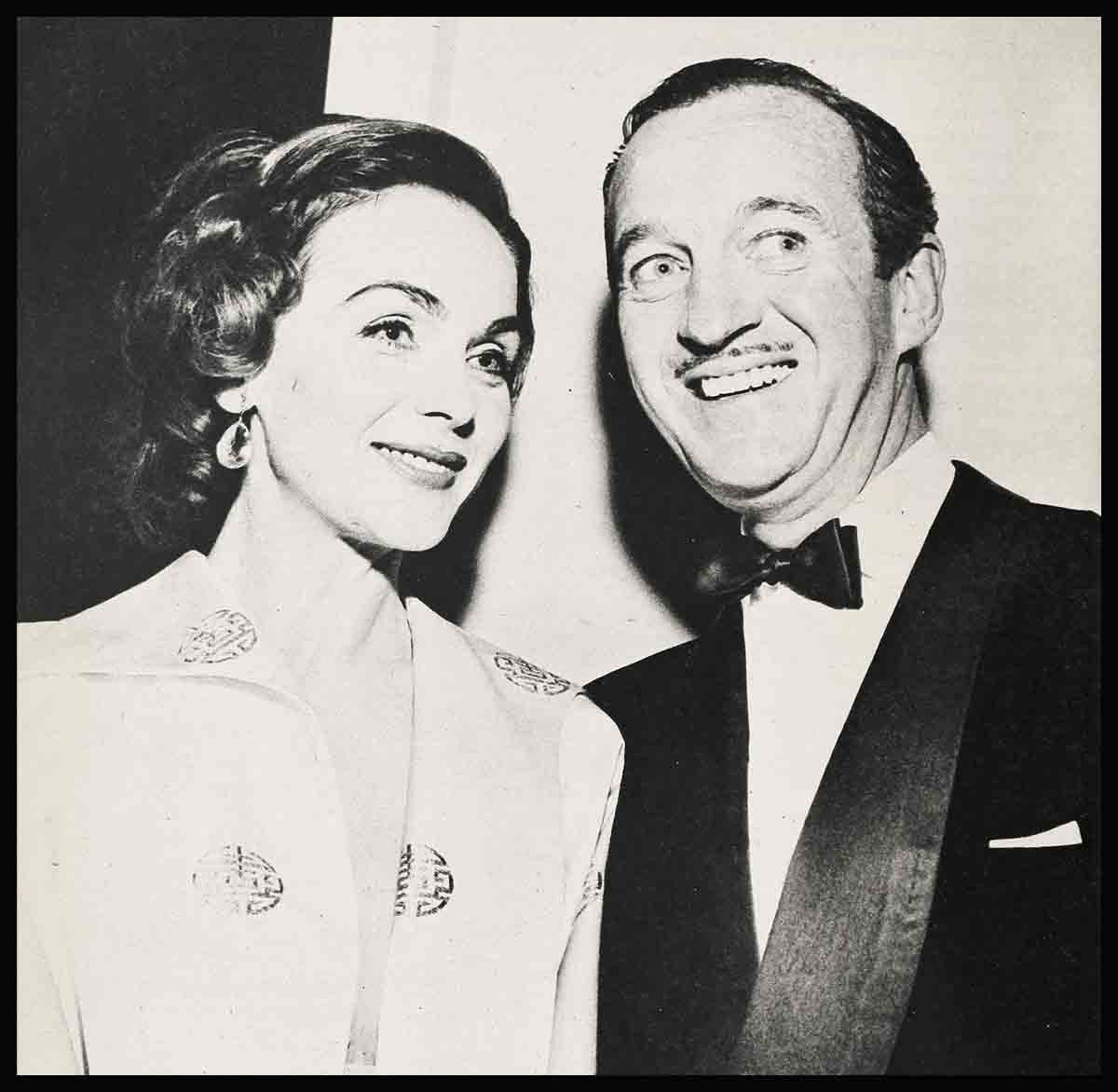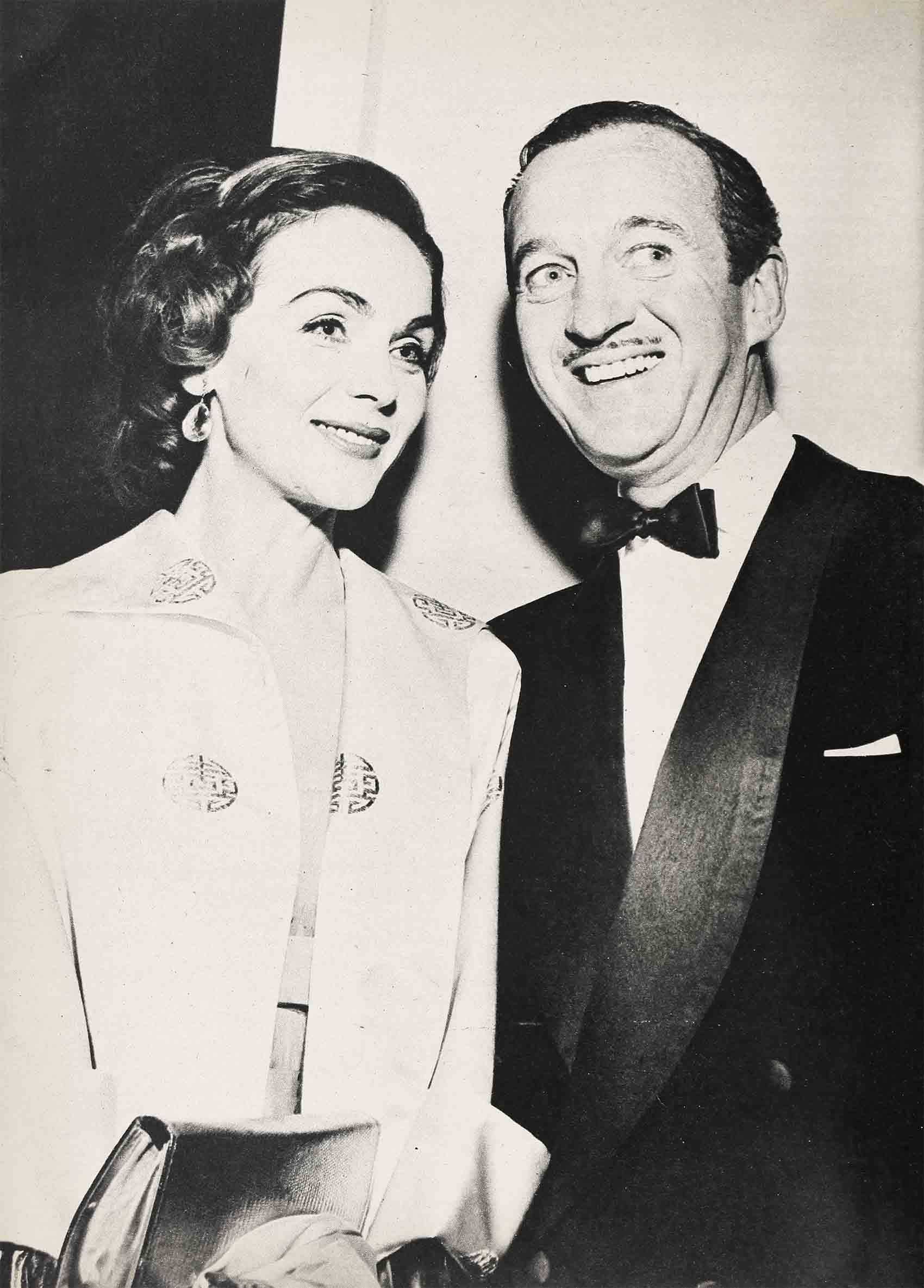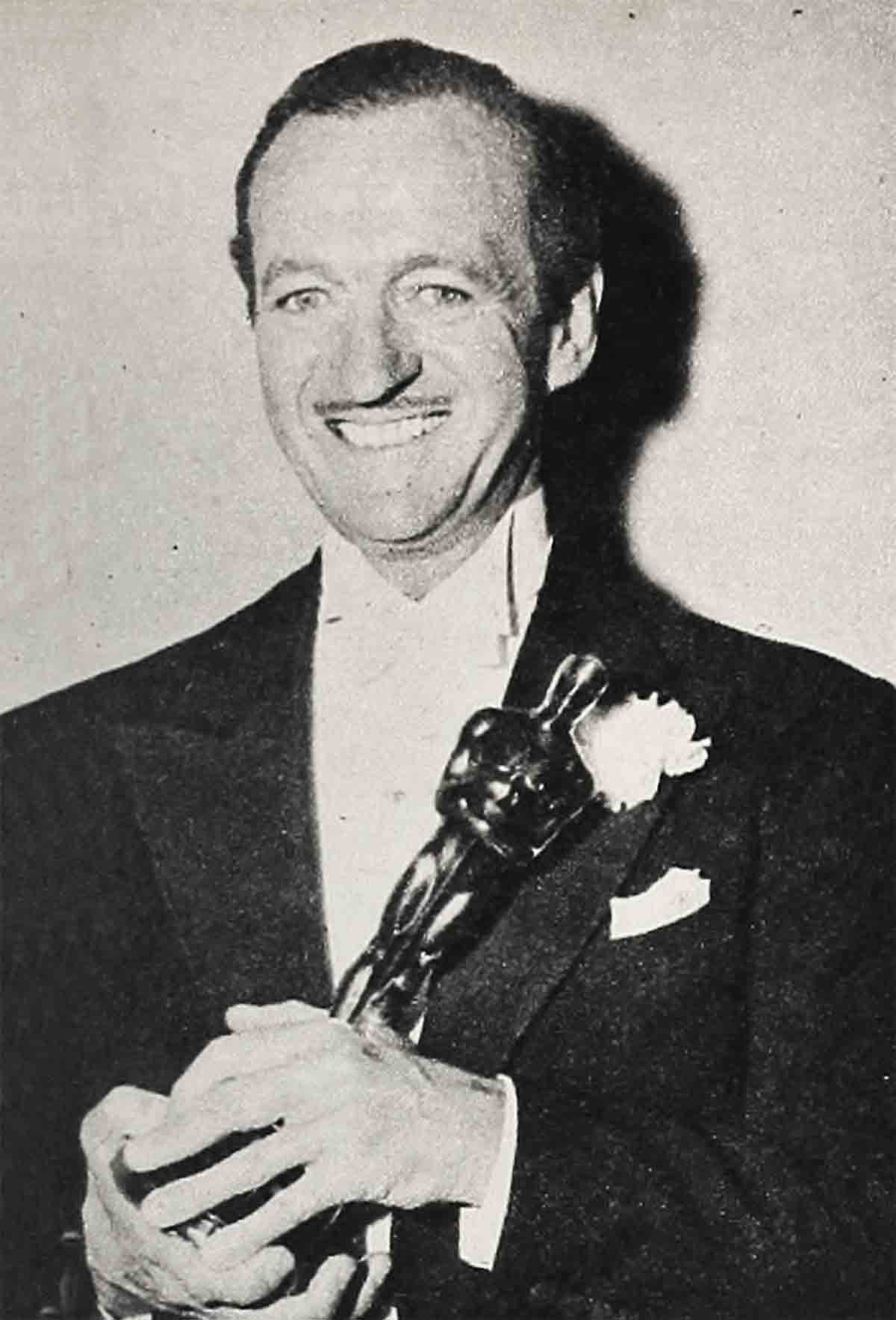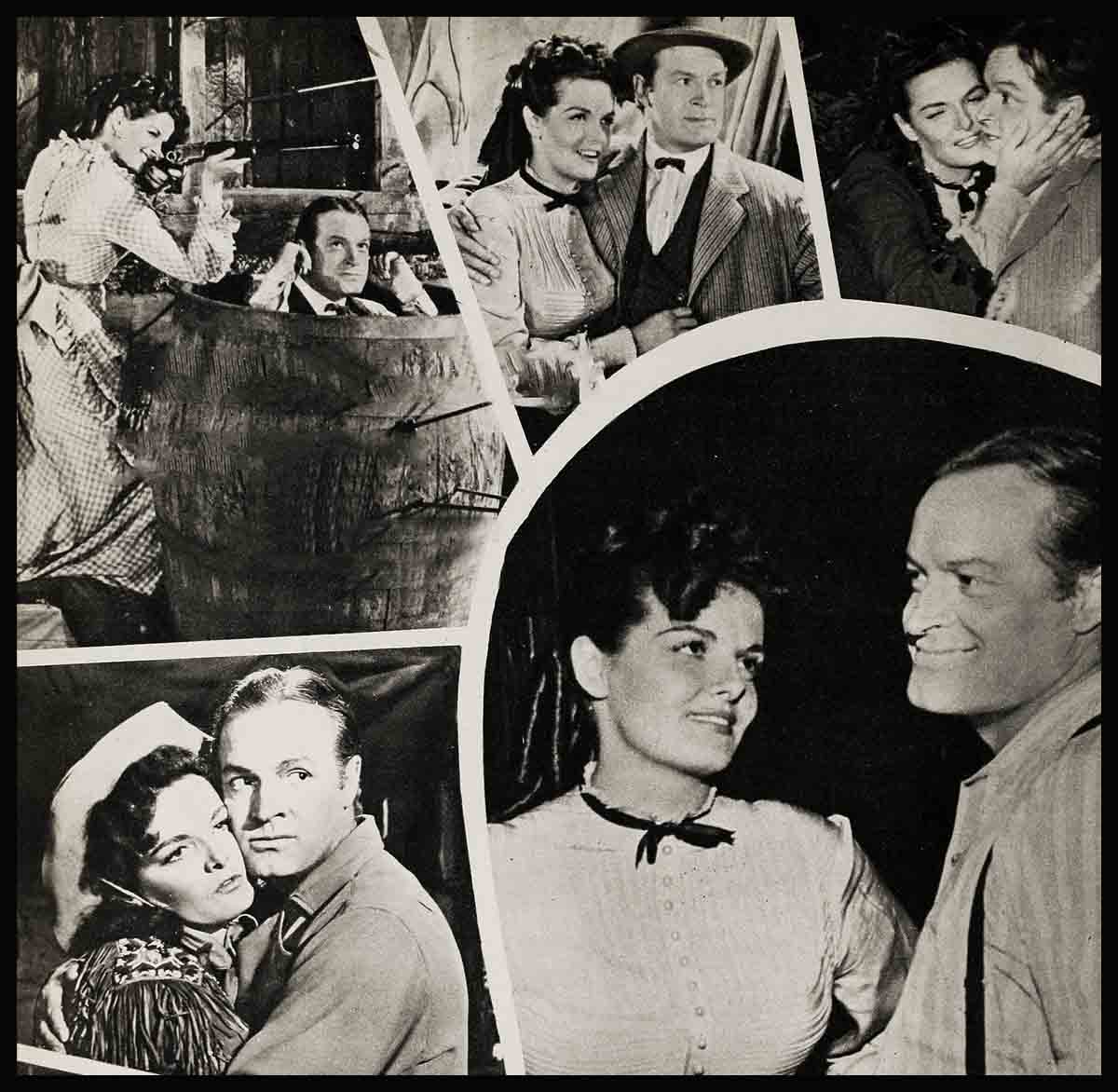
After 11 Years—David Niven
In the typically terse, well-bred style of a British gentleman, David Niven, in mid-July, issued a statement to the press that he and his wife Hjördis had separated after living apart for the last several weeks. “No divorce is contemplated at the present time,” the Academy Award-winning actor stated. “We are trying to work out our very personal problems as quietly and as privately as possible.”
The film colony was shocked and dismayed; only a handful of insiders were aware of growing dissension in the Niven home. Publicly, there was no hint of trouble. Fans remembered that on Academy Award night only a few months ago, Niven had jumped up from his seat in the Pantages Theatre as he heard his name called. But before he ran down the aisle to fairly bound onto the stage, he paused to kiss his strikingly beautiful wife.
On stage, the famous Niven charm did not desert him as he grinned, clutched the statuette and said, “I’m so weighed down with. good luck charms that I could scarcely make it up the stairs.” The lucky charms were potent enough to bring him the greatest honor in his 25-year Hollywood career but not strong enough to keep his marriage from foundering.
At the glittering Beverly-Hilton party following the awards, David spoke of the Oscar he’d won for “Separate Tables” and of his wife with equal pleasure. Columnists commented that the handsome pair appeared the very picture of devotion. Obviously, “Separate Tables” was prophetic, for the Nivens, who were thought by many so well suited to each other, will now, too, be dining at separate tables.
Prophetic, also, was debonair David’s remarks to a reporter two years ago: “Why do I always seem so pleased with life? Well, possibly because I am healthy, I live in the middle of a very happy family with my wife and my two sons, and I have some money in the bank. So, for the life of me, I can find nothing to be depressed about. Of course, I am fully aware that any day now I may wake up to find myself diseased, divorced and destitute, but as I say, things are very pleasant at the moment.”
David Niven is today in fine health, very far from destitute, but divorce looms as a tragic possibility to shatter the pleasant rhythm of his days. He gathered up his two sons by: his first marriage and left for a month’s stay in Honolulu with friends before he returns to make “Please Don’t Eat The Daisies.” Hjördis is staying with friends in Brentwood. Those who are very fond of the Nivens hope this “cooling off” period may lead to a reconciliation. Deborah Kerr, who herself is beset with marital troubles, is a close and old friend of the Nivens and is trying to patch up their foundering marriage.
That marriage, a second one for both, after a whirlwind courtship, on January 14, 1948, appeared to their large circle of friends, to be an ideal one. As late as last year, Niven was saying of his two marriages: “It has been a source of wonder to me that a man could be so fantastically lucky twice in picking remarkable women to marry. After a tragic accident my first wife died, leaving me with two small children. Only a very special person could pick up the shattered and lost little family that was mine at that moment and weld it into the happy group it has become ever since Hjördis appeared on the scene. She knows me much better than I know myself. She also smiles tolerantly at all my foibles. And with all her wonderful qualities, she is also a visual delight.”
Hjördis, a famous Swedish fashion model, was called “one of the most beautiful women in all Europe.” She’d been married to a wealthy Swedish business man, Carl Gustav Tersmeden, from whom she’d been divorced in 1947, During a London vacation she was invited to a set at Pinewood Studios where “Bonnie Prince Charlie” was being filmed. She sat down in a canvas chair plainly labeled “David Niven” on the back.

“The film,” David recalled, “was an absolute disaster and I was finishing it preparatory to returning to Hollywood. In my long blond curled wig and dashing red kilt, I stepped away from the camera and was very annoyed to see someone sitting in my chair. ‘Throw her out!’ I told the prop man, crossly. Instead, he told her politely that Mr. Niven wanted his chair. The young lady thought that rude and said so. ‘Certainly I’ll give him his chair,’ she agreed, ‘but who in the world is Mr. Niven?’ I went over to tell her but my anger evaporated as I looked into her lovely eyes and it seemed only proper to invite her to lunch.”
And after that, dinner together seemed a good idea to both. Two days later, Niven asked Hjördis to marry him, and ten days later, they were on their way to a London registry office for the ceremony. As they entered the room, David, in an off-hand manner, whispered to Hjördis, “Remind me to pick up the children at their school as soon as we’re finished.”
The slim, tall, blue-eyed beauty came to an abrupt halt. “What children?” she blurted out. It seemed that David had forgotten to tell about the sons of his first marriage. He vowed he did; has said she was so bemused by love that she didn’t listen. It became a huge joke between them. And though David, an incomparable raconteur, delights in telling stories which cast a somewhat doubtful light on his integrity, the truth probably is that it is just a story, since David was, and is, a devoted father.
At any rate, they gathered up the boys and returned to Hollywood—to live a rather Bohemian existence in the spacious, rambling English country house in the Pacific Palisades near the ocean, a house which Niven has owned for many years. Lovely Hjördis stayed completely out of David’s professional limelight; she enjoyed her role as mistress of the establishment, loved swimming in their saltwater pool, playing croquet with David and friends (“The Nivens always win because we know where the bumps are”), and watching the changing ocean from the living room windows. “I never want to live anywhere else,” Hjördis told friends. “I love this house as much as David does.”
Yet today the house is closed—the laughter has fled.
But when they first came, they took their place in the sophisticated life of the film colony, even as, in their extensive travels, they moved in the worldly international set of Noel Coward, Sir Winston Churchill, and the Rainiers of Monaco. When the Duke and Duchess of Windsor paid Hollywood a visit recently, the Nivens were chosen to sit at their table at an elegant dinner party.
David and Hjördis were known to have the same tastes, delighting in deep-sea fishing; were skin-diving addicts long before it became a popular sport. They also enjoyed excavating for valuable relics, vases and coins in Italy. Two years ago they flew around the world on a five-month vacation.
An indefatigable letter-writer, he also sent back periodic reports of his travels to all the local columnists, who adore him. “Niven,” said one lady gossip-writer, “is absolutely loaded with that debonair charm, the kind that comes from being sure of one’s self, and yet not giving a good gosh darn. He’s the type of man who is a long distillation of heritage, habit, culture and wealth, overlaid with talent. Even in frayed linen and empty pockets, driving a borrowed car, he can make a millionaire feel inferior. The nice thing about the smoothness of this chatty chap with the winning wit is that he underplays it, stopping safely short of the handkissing line.”
Can it be that men of charm like Niven’s great friend, Cary Grant, are not a success as husbands—that pure charm wears thin in day-to-day living?

Cary’s three wives possibly found that this charm, like a faucet, can be turned off at home, and thus account for three divorces. Hjördis Niven doesn’t say, but not long ago she did hint that her husband is very set in his ways, even a bit stubborn. “David,” she declared, “can be pig-headed, inflexible about things. This can be trying at times. He believes in long-range planning, even likes to plan years ahead. In 1950, he’ll say, ‘Now, in 1955 we’ll do this or that.’ The plans never work out, of course.
“Also, when he becomes angry, he keeps things to himself. When I lose my temper, he goes into the cellar and stays there for three hours. He simple won’t fight back, which, as any wife knows, is very frustrating when you’re itching for a good slam-bang argument.
“I’m a late sleeper,” continued Hjördis “and a grumpy waker-upper. And man mornings I’ll find David at the foot of the bed, attired in top hat and cane of some other outlandish costume, doing old London music hall number. It is infuriating to have to laugh before breakfast. But you can’t stay angry with that man. Even when you have the bedroom papered in a very smart but deep charcoal and he goes around muttering about sleeping ‘in the black hole of Calcutta.’
“But I think it makes a wonderful background for paintings—those we’ve bought and David’s and my originals. I’m been trained as an artist in Sweden, and when David took up painting, he soon was doing excellent work, painting circle around me. It’s rather irritating to me ego. But really, I’ve always found David just as charming at home as he is on the screen. I’ve never been bored a moment.
There are those who say Hjördis was bored at home, left too much to herself while David, when he wasn’t working of a film, allotted half a day to keeping up his voluminous and witty correspondence the other hours to acting as vice-president of the hugely successful Four Star Play house TV series he owns with Dick Powell and Charles Boyer. Evenings went spent on “homework”—a full briefcase scripts to read for his own television show. “Because of our TV venture,” he grinned, “you might call me a tycoon or at least, one third of a tycoon.”
The beautiful Swedish ex-mannequin may have wondered: Did success spoil David Niven? Is it true that the Oscar he carried home so jauntily last April went to his head? While the polished raconteur and sophisticate (“I believe that I am a true sophisticate”) continued to enchant his listeners, there was a him that after Oscar time, David began to to feel his oats somewhat, to take himself a bit too seriously. His temper became edgy, his wit a little sharp and was inclined to sudden shows of annoyance with co-workers. All this may have been a reflection of growing unhappiness at home. At any rate, when he wanted something, according to an intimate, “he set about getting it with a little less and suavity than one would expect in very proper British gentleman.”
It was noticed by co-workers that David look his role of the dishonored British major in “Separate Tables” very, very seriously. He apologized to his co-star, Deborah Kerr, telling her, “This major-bellow touched me and I wanted to do him justice. I couldn’t think of anything else. So I sort of locked myself away from the rest of the cast. I hope they didn’t and me dull.”
No one could ever call David Niven dull, but it was noticed that he took the whole Oscar race Very Big. Hjördis is known for her live-and-let-live attitude toward life while David is a continual worrier. “Waiting out the awards was a terrible strain for six weeks,” David confessed. “I didn’t even want to talk about it or have it mentioned: around the house by my wife or sons. The whole strain really got me and I’m afraid I showed it at home.”
A careful man with a penny, Niven, clearly a red hot contender for Oscar honors from the very beginning, actually paid for several thousand dollars of personal ads for himself. It’s been rumored that Niven has a predilection for squeezing the buffalo on an American nickel. And there is the feeling that the man who confesses he’s a “wire coat hanger saver” may have been a bit too careful in financial matters for a wife who’d been the darling of a wealthy first husband, noted as one of the best-dressed women in the film colony.
According to that lady, “the one day in the month that David is not his charming self is the first day. The bills come in. David goes around all day with a long face. Believe me, there is no roguish humor that day. But he is divine to go shopping with. ‘Take it, take it,’ he says, mopping his brow and anxious to leave. And inevitably comes the first of the month. Sometimes I go to the cellar!”
Hjördis also admitted that David is “house proud. He simply adores his antiques, the exquisite Regency pieces he brought with him from England, a wonderful Chippendale table, fine old mahogany and satinwood. I had two poodles that I adored but they climbed all over the furniture and I’m sorry to say, they slowly ruined it. David, poor dear, stood it as long as he could. Then one day he announced: ‘The dogs have to go!’ And they went.”
Like many British fathers, David is a stern disciplinarian to his two sons, David, Jr., now 16, and Jamie, 13. On the set one day Niven was telling pals how he had to punish David, Jr., for some infraction at school. “I told the boy,” Niven said, “ ‘Chum, I have to punish you but it will hurt me more than it does you. Since I don’t relish the role of the cruel father, I am going to let you choose your own birch switch!’ ”
When David and Hjördis were married, the boys were mere youngsters of six and three. But now that they are in their teens it may be that the Nivens are at odds on how they should be reared.
Only the two partners in this marriage really know what has lead them to a parting of the way after 11 years. A close friend scoffs at rumors of a triangle. “I don’t believe for one minute that any outsiders are involved,” she said. “I’ve seen this rift widening between the Nivens for some time and I think they were powerless against it. Hjördis hasn’t been well lately and she’s been leading too solitary a life, whether by choice or not. David, a gregarious soul, has been so busy with all his projects that he hasn’t been able to devote himself to her as he did some years ago.
“I think these two genuinely nice people have just fallen out of love—have found the growing incompatability of temperament has made them miserable together. And rather than go on, living a lie as a happily married couple, they’ve agreed to handle it honestly and separate. In time, I believe, they’ll agree on a quiet divorce. It’s sad, but that’s how life is sometimes.”
James David Graham Niven has had his share of sadness, beginning with an unhappy childhood. He was born 49 years ago in Kurriemuir, Scotland, the son of a wealthy military. man, William Graham Niven, and Henrietta de Gacher. When David was six, his father was killed’ in World War I and his beautiful French mother married Sir Thomas Comyn-Platt. Recalls David, “My stepfather disliked me intensely and I him; shipped me off to a boarding school. I felt completely alone in the world, a miserable and insecure lad brought up in the Spartan ‘stout fellow’ tradition in which tears are frowned on. In school, I got into a spot of trouble and my stepfather, who had hardly ever spoken to me, had me sent to a kind of reform school for a few weeks. I haven’t spoken to him in the last 25 years.”
Later the boy was transferred to fashionable Stowe School where he contracted a rare disease of the jugular vein. He wears a silver tube in his throat and was operated on seven times. Later he was enrolled at Sandhurst, Great Britain’s West Point. Bored with Army life, the handsome six-foot, blue-eyed and red-haired penniless army officer resigned, went to work in the lumber camps of Toronto, when a friend offered him a free ticket. Soon the officer-gentleman-lumberjack hit New York and promptly moved into the Waldorf-Astoria, though he was completely without funds (“always travel first-class, old boy; I insisted on it even in my leanest days”). Niven’ had met heiress Barbara Hutton briefly in London, phoned her in New York, and became a guest at her Palm Beach estate.
“For years,” says Quentin Reynolds, “David was a bum trading on his smile and his charm for ham and eggs.” He hobnobbed with society, hugely eligible as a result of his charm, his correct British accent and his aloof bearing. After a short period as a soldier of fortune in Cuba, Niven finally reached Hollywood where he became a professional house guest of such notables as the late Douglas Fairbanks, Sr. The town’s important hostesses vied for him as a dinner guest while he was literally living by his wits. Lack of funds forced him to develop an ingenuity and degree of charm which might, in more fortunate circumstances, have remained dormant.
Niven’s rise as a film actor was unspectacular but slowly he became a fine actor until his career was interrupted by the war. In London, he married his first wife, Primula Rollo, daughter of the Honorable William and Lady Kathleen Rollo. She’d been in Hollywood only six weeks when she stepped through a door in the dark at the late Ty Power’s home and fell to her death. At the time, Niven said simply, “When I lost Primmie, I lost a part of my life. It was like going crazy very slowly.” Friends reported that he very nearly attempted suicide on at least two occasions.
The patchwork of David Niven’s life has been filled with tragic happenings. And the separation from Hjördis is the last one. It is hoped that his personal philosophy will sustain him. “I am convinced,” he said not long ago, “that heaven and hell are right where we are on earth. Life is a Grand National Steeplechase. We are given certain hurdles to get over and certain opportunities. If you don’t spot the breaks, you miss them. It doesn’t matter who wins. It’s getting around the course that counts.”
THE END
—BY NORA LEWIS
It is a quote. SCREENLAND MAGAZINE NOVEMBER 1959





No Comments